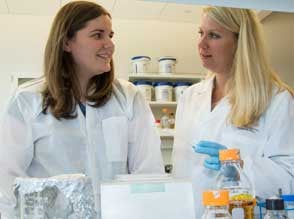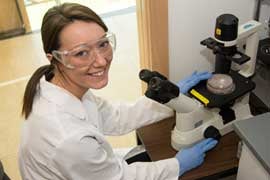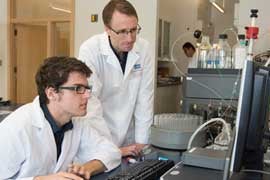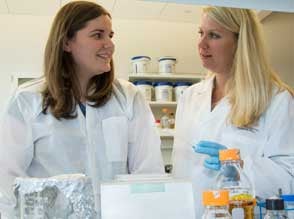Bilida is one of 21 undergraduates who have been chosen for a Summer Undergraduate Research Fellowship at URI. The Rhode Island College junior was assigned to work in the lab of URI Associate Professor of Pharmaceutical Science Kerry LaPlante, a nationally recognized researcher in drug-resistant bacteria including MRSA.
“It opened my eyes,” Bilidia said. “She was presenting ideas that I never had thought of.”
 A biology major from East Providence, R.I., Bilida is exactly the type of promising student that the U.S. government is trying to help with a $19 million grant renewal to URI to train talented individuals in biomedical research. Bilida is even more committed to a career in microbiology or molecular biology since her second summer of research funded under the IDeA Network of Biomedical Research Excellence grant, which has provided nearly $61 million to URI since the program began in 2001.
A biology major from East Providence, R.I., Bilida is exactly the type of promising student that the U.S. government is trying to help with a $19 million grant renewal to URI to train talented individuals in biomedical research. Bilida is even more committed to a career in microbiology or molecular biology since her second summer of research funded under the IDeA Network of Biomedical Research Excellence grant, which has provided nearly $61 million to URI since the program began in 2001.
“I feel that I have a more broad spectrum of knowledge,” she said. “I’m going back to the lab at RIC in the fall; I feel there’s a lot of new information that I can add.”
Ninety-five undergraduates in the program are placed in labs at URI, Brown University, Bryant University, Providence College, Rhode Island College, Roger Williams University and Salve Regina University.
Undergraduate and some graduate students are sitting down at the bench, some for the first time, to work on potential treatments for infectious diseases, breast cancer and Alzheimer’s, alongside post-doctoral researchers and under the eyes of senior scientists.
 The sense of community among students and scientists was an unexpected benefit for URI pharmaceutical science major Julie Scott, of Taunton, Mass.
The sense of community among students and scientists was an unexpected benefit for URI pharmaceutical science major Julie Scott, of Taunton, Mass.
“I never thought I could get into research. I thought there was no interpersonal communication. You don’t realize that relationships are everywhere,” said the second-year student.
Although Scott thought she had good lab techniques, her lab mentors “taught me all these little things that you learn from experience.”
She says the summer job allowed her time to delve into a lab project without the pressures of the academic year.
The pharmaceutical science major learned how to make nanoparticles from copper and gold for use in breast cancer research. The nanoparticles are hollow balls less than the width of a human hair being tested for delivering cancer medicine into human breast cells. Scott is working in the lab of Wei Lu, a nationally known cancer researcher and URI assistant professor of biomedical and pharmaceutical sciences.
 URI Honors Program student Miles Martin had been planning to work in a pizza shop this summer, but the honors program director strongly encouraged him to apply for the INBRE-funded lab work.
URI Honors Program student Miles Martin had been planning to work in a pizza shop this summer, but the honors program director strongly encouraged him to apply for the INBRE-funded lab work.
Miles tested a series of compounds from pomegranates to determine which can stop bacteria from communicating with one another. He worked in the lab of David Rowley, a pharmacy professor and coordinator of the Rhode Island INBRE grant.
“I’d never been to a lab before. I honestly had no idea what to expect,” Miles said. Would I be scrubbing test tubes?” Now the South Kingstown, R.l. resident is searching for the smallest active part of compounds and using the fast protein liquid chromatography system for separating or purifying mixtures of carbohydrates. Miles said he doesn’t know whether research is for him, but he does want a science career.
“I just like explaining how the world works,” Martin said. “It’s empowering.”
The research of all the students culminates in poster presentations at the annual SURF Conference on Aug. 1 in URI’s pharmacy building.
Bilida will be presenting information on how ethanol and heparin with and without preservatives influence Staphylococcal biofilm growth.
And if this part of the program succeeds the way it’s intended, these students will be fully fledged biomedical scientists someday taking their turn as mentors.
Pictured above
Sara Bilida, of Rhode Island College senior works in the lab of URI Associate Professor of Pharmaceutical Science Kerry LaPlante, Ph.D., who is nationally known for research in drug-resistant bacteria including MRSA.
URI second-year pharmaceutical science student Julie Scott is looking through the microscope at a petri dish of cultured mouse breast cancer cells. She is working in the lab of URI Assistant Professor of Pharmacy Wei Lu, Ph.D., a nationally known researcher in nanoparticles for use in breast cancer research.
Miles Martin has been conducting experiments for Associate Professor of Pharmacy David Rowley, Ph.D. Martin works with bacteria that is associated with pneumonia complications of cystic fibrosis, infection in burn injuries, and urinary tract infections.
Photos by Nora Lewis

